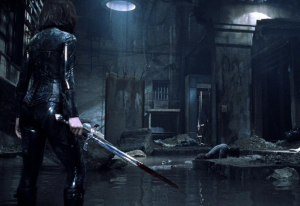The Walking Dead Universe RPG draws heavy inspiration from the comics series turned television franchise, leaning into each of the show’s most common tropes to build an RPG that’s heavy on conflict but not overly bogged down by rules. The new RPG, built upon Free League Publishing’s Year Zero Engine, boils down the unique cadence and focuses of The Walking Dead – survival and exploration, interpersonal conflict, and of course zombie swarms – into easy to use systems that should be easy for players to pick up and use. What’s perhaps most impressive about the the new game is that it feels specifically like a Walking Dead RPG as opposed to a generic zombie RPG, one that should appeal to fans of the show without diving too much into the mythos of the franchise.
Videos by ComicBook.com
Over the course of 193 comic issues and 11 seasons of television (not counting the spin-off shows), The Walking Dead built up a familiar formula for telling stories within the zombie apocalypse. A group of survivors established a haven of some kind and regularly went on supply runs while discovering external threats and dealing with interpersonal conflicts within the group. Over the course of the arc (or sometimes several arcs), the various external threats and interpersonal conflicts would eventually boil over, almost always with violent results. The key to The Walking Dead and what separated it from other zombie franchises is that the zombies were presented as an inevitable threat that often cropped up at the worst times, but was often drowned out by the extreme measures the living took to survive in a ruined world.
In The Walking Dead Universe RPG, players use pools of six-sided dice to make skill checks, with a six representing a success. Players typically only need to roll a single six for a success, although direct conflicts with other PCs or other NPCs are resolved with opposed rolls in which the most sixes rolled win. The game also uses a stress system that allows a player to add stress dice (a differently colored d6) to their skill rolls with higher stakes. While players can choose to take a point of stress to re-roll a skill check, rolling a one on a stress dice causes a player to “mess up” (the actual name of the mechanic) and results in a complication, usually an increase of the Threat Level that denotes the overall interest level of the Walkers always lurking in the background. The stress system works similarly to the Alien RPG’s stress system, which uses the same game engine as The Walking Dead, but with an emphasis on attracting walkers instead of panicking.
Character creation in The Walking Dead Universe RPG is based around choosing one of 12 different character archetypes, each of which have a handful of unique talents. Players then stat their character’s attributes and skills, which flow through to the number of dice used to make skill checks. Character creation also comes with several built-in roleplaying prompts via an Issue – a character flaw and a Drive, which is a motivating factor that allows players to add two extra dice to a single skill roll per session. Players also have two Anchors, who are characters within the survivor group (a PC and an NPC) that can relieve stress when players speak to them. I like that the game blends mechanical options with roleplaying in a clean fashion, providing some easy prompts for players to use during sessions.
While The Walking Dead Universe RPG isn’t a combat-focused game system, it acknowledges that violence is a foundational part of the franchise. The game uses a straightforward system to deal with the inevitable conflict that arises from either the living or the dead. Combat is determined by skill rolls (each player character has a close combat skill and a ranged combat skill that provides a baseline) and a small pool of three health, reflecting the general lethality found in The Walking Dead. When a player’s health reaches zero, they suffer a critical injury that can either be lethal or non-lethal, although the players can still save their friend if they can find medical attention in time. Again, critical injuries provide players with an additional roleplaying prompt, giving players the choice to abandon their companion or venture into even a potentially more dangerous situation to save their friend.
Battling walkers is generally higher risk than facing off against the living, as a failure means rolling on a “walker attack” table with a variety of harmful effects. As best, players take stress when rolling on the walker attack table and at worst, a player will suffer a sudden and horrible death. There’s also a sub-system for facing off against swarm of walkers, with players collectively rolling to see if they can hold off or reduce the zombie swarm. One thing I like about the walker system is that players can choose to sacrifice someone else (either a PC or an NPC) to try to escape the swarm. If a player wins an opposed roll, they escape combat and force the loser to roll on the walker attack table. If the player’s attempt fails, they have to roll on the walker attack table. Either way, an attempted sacrifice counts towards the group of checks a player makes against the swarm, since even throwing an (unwilling sacrifice) to the throngs of walkers can provide an opening to get away.
Other key subsystems in The Walking Dead Universe RPG includes discovering and building a haven from walkers, and making supply runs to collect more supplies. The game also focuses on interactions with rival factions, each of whom have their own issues and challenges that drive them. There’s almost an assumption that things will break down between a faction and the player group of survivors, although the game doesn’t have any specific mechanic or system to determine how a particular group may feel about the players at a given moment. Instead, the game assumes that roleplaying and the game master can create enough conflict or intrigue to build towards a full-fledged endgame.
Based on a readthrough of the rulebook, it appears that Free League has identified the key characteristics of a Walking Dead story and successfully built up a roleplaying game around them. The core mechanics of the Year Zero engine is generally rules light and focuses on quick resolution rather than playing things out using complex tactics and spacing on a map, which generally works well within The Walking Dead Universe. However, players should understand what they’re getting into when they jump into The Walking Dead – it’s a game where your character can die very quickly based on one poor roll and also one where a player can sacrifice another character in a trying moment. There is a small section on player safety at the start of the book, but players need to make sure that safety tools are agreed upon and in place before the game starts because there’s not a lot of “off-ramps” to de-escalate a poor decision or two within the mechanics themselves. The system is also somewhat limited to what kinds of stories you can tell, but then again this is a Walking Dead game and not a wider zombie RPG system. If you’re a fan of The Walking Dead and tabletop RPGs and want to build out your own campaign of deadly survivors and other deadly threats, Free League Publishing has provided a strong system for you to try out.
The Walking Dead Universe RPG is available now with both a core rulebook and a Starter Set designed to help ease players into the game.








